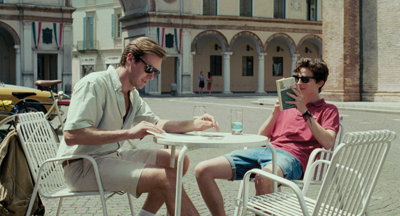
Call Me by Your Name's opening credits set the mood perfectly, with aspects of antiquity — sculpture, painting, books, other ephemera — arranged in tableaux and paired with the name of someone from the film’s creative team. The elegant piano of John Adams lets the viewer know, without words, that the coming film will span a significant amount of time, that its emotions will shake foundations and reveal previously hidden treasures and that, as composer Sufjan Stevens does in his best work, the grandest of emotions will somehow be distilled into something soothing, explosive and ultimately at peace with the world. We know to expect Stevens’ voice because the opening credits promise it, but we must wait — until the relationship at the heart of this sincere and haunting film is pulled together.
Elio (Timothée Chalamet of Lady Bird and Interstellar) and Oliver (Armie Hammer, the Lone Ranger himself) aren’t just the monolith towering over gay Twitter for almost a year now. As the central characters of Call Me by Your Name — elegantly pared down from André Aciman’s 2007 novel of the same name by screenwriter James Ivory (of Merchant Ivory Productions’ everything, including Room With a View and Howards End) and directed by Luca Guadagnino (I Am Love, A Bigger Splash) — they are the marketable faces of queer desire, and they’re the reason The Psychedelic Furs’ “Love My Way” is packing dance floors all over again. Both are exceptional performances, Chalamet pinballing his way through people’s lives, Hammer an Adonis-faced instrument of inertia and diffidence. Both have moments that will break your heart, as do Amira Casar (of Catherine Breillat’s Anatomy of Hell, which is a stunning film worthy of proper shock, awe and pearl-clutching) and national treasure Michael Stuhlbarg as Elio’s parents, the Perlmans. Stuhlbarg has rightfully been racking up accolades for a monologue he delivers late in the film, but Casar is just as good, especially on multiple viewings as one realizes she’s been mending emotional hairline fractures and bruised hearts all along.
Like each of Guadagnino’s other films, this is an enchantment — a boozy swoon that leaves the viewer dazed and all too aware of how often we keep ourselves in emotional stasis. But unlike the director’s previous work, Call Me by Your Name knows the value of the delicate touch. Chalamet’s live wire of a performance brings to life the grand, operatic gestures that define Guadagnino’s other films, allowing the “real” world to exist on its own terms. The Perlman family villa at Crema need not dazzle the viewer with its perfect fusion of antiquity, the moment and the uncertain future. Its produce and colors and books and music are always there, drawing the eye, and then with it the soul.
So in this idyllic space, among polyglot intellectuals and near-Maxfield Parrish landscapes, we have the two lovers of the piece. Elio is 17, a musical prodigy, and not as conscious of the feelings of others as he thinks he is. Oliver is 24, a classics scholar and medical student, a tightly wound ball of uncertainties stuck in the shell of a matinee idol. Both have cultivated outward personae that traffic in finely tuned bravado and a sense of being ahead of the game, so during the course of the delicate, subtle Eurodisco (Moroder to F.R. David) and avant-garde piano (Sakamoto to LaPlante) summer, they figure one another out. And it’s deeply moving, though as with Brokeback Mountain, gay passion can only unfurl at the cost of wasting the emotional time of women giving incredible supporting performances. Someday there will be a crossover hit about gay men who only have relationships with gay men — a gold-star-gay hit. Someday.
Cinematographer Saymobhu Mukdeeprom, who worked with director Apichatpong Weerasethakul on some of the greatest-looking films of the past couple of decades, must have some form of earth magick at his call, because this film looks like nothing else in theaters right now. With a single lens and 35 mm film stock, he summons a lush, tactile image that an army of digital massagers couldn’t render, and the delicate grain structure meshes expertly with the sounds around the viewer — piano and synthesizer, bird chirps and frogsong.
This film isn’t for everyone, and that’s OK. It’s a love story that never becomes entangled with tragedy, where the villain is time. It’s a deliberate journey, where pinpoints of memory flip past too quickly, or linger longer than need be. And it isn’t until the characters find voice to name the inchoate swirl of emotions between them that we are righted in time, a single long-take shot around a WWI memorial that fixes us in time and space, for all to then unfold.
Email arts@nashvillescene.com





